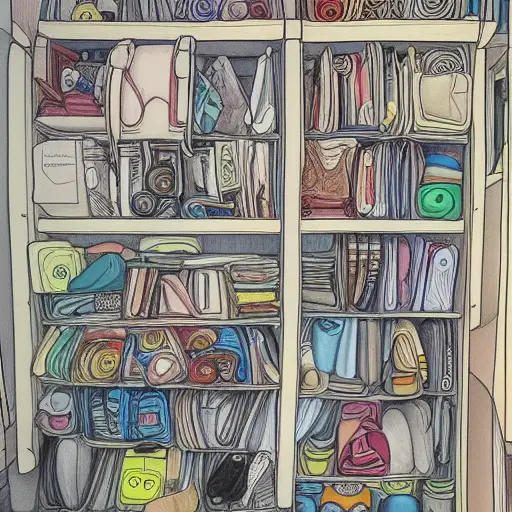Among the best tips for dealing with a hoarder is to focus on harm reduction. Harm reduction emphasizes decreasing the risk of injury and accidents. It should not be about reducing clutter. Instead, the focus should be on making the home safer. This will help the hoarder feel comfortable with the idea of discarding things as the organizing process proceeds.
Be supportive
It is important for anyone who cares about a hoarder to support the organization process. While it can be difficult to work with someone who has hoarding disorder, there are ways to help them. One of the best ways is to be supportive and patient. If you are trying to help a loved one who is suffering from hoarding disorder, remember that change often comes slowly. There are many different stages of the process, and it is important that you do not expect perfection.
If you are not sure where to start, consider reaching out to a hoarder organization. They provide information and materials that can help family members and professionals better understand hoarding. If you are unsure, you can always ask an unbiased support person. They can also provide information on how to get help for their loved one.
If the hoarder is ready to let you work with them, consider hiring a professional organizer to make 1-3 home visits. These organizers can also accompany hoarders to hearings, inspections, and storage facilities. In addition, they can also help connect the hoarder to peer support groups and other resources. Remember, however, that the professional organizer cannot touch the hoarder’s possessions or set goals.
If the hoarder’s house is untidy, consider hiring a professional organizer to help them organize the clutter. These organizers are specially trained to deal with hoarding issues and are often able to help hoarders organize their home. Some of these experts even offer free hoarding assessment tools to help you know the level of hoarding in your area.
Set achievable goals
Hoarders are often unable to make decisions and struggle with motivation, so it’s important to set realistic and achievable goals. While a loved one will most likely appreciate some help, they may not have the motivation to tackle the whole mess by themselves. Be patient, set realistic goals, and work at their pace.
While a small home may not be possible for someone suffering from hoarding, it is not impossible to organize one room a day. Begin with a Disposal Plan for recyclable and unusable items. If large items are involved, it may be necessary to rent a dumpster. For items that are useful and necessary, consider a Keep Forever/On-Hand strategy. Those items that have a higher value should be sold, appraised, or given away to friends or family.
The most challenging part of tackling hoarder organization is decluttering. It can be emotionally exhausting, but by making attainable goals, you’ll be able to get more organized. You should set specific dates for organizing each room, and designate a designated area for sorting. Once you’ve gotten through each room, try to avoid second-guessing your decision on what to keep and discard.
Avoid being an enabler
If you suspect that someone you know is suffering from hoarding disorder, it’s best to avoid being an enabler. Often, people mistakenly assume that hoarders collect nothing but junk. However, most homes contain valuables. Moreover, hoarders don’t just store trash and clutter in their homes. They also collect memories and treasured items.
Avoiding enabling behavior is important because hoarders need your help to change. Moreover, they may feel defensive when confronted with negative comments. Instead, try to focus on encouraging comments. You might focus on the cleanness of the kitchen counter or the stairs. By doing so, you’ll help the hoarder clean up his or her house, making it a safer place.
Be a friend
As a friend, one of the best things you can do is be patient. Hoarding is a very challenging condition, and many times, people who are suffering from it cannot change their habits on their own. As a result, they need a lot of help. Being patient can make it easier to reach your loved one and help them clean out their home.
The first thing to do is to start with the laundry. If you find the clothes are not worn, ask yourself if you will ever wear them again. This is a good place to bring in a friend with an unbiased approach. Then, you can decide whether to donate or sell these items.
Another important thing to remember is that decluttering a hoarder’s home should not be done in a weekend, because it can lead to PTSD-like symptoms. It is best to start the process in small increments, and work your way up. This way, you will not become overwhelmed. This will give you the chance to achieve your goals without getting overwhelmed and giving up.
It is also important to avoid enabling the hoarder. It is not easy for a hoarder to let go of their possessions, and you should be patient and understanding. Never offer storage space, go shopping with them, or bail them out financially. If your family member is having problems dealing with a hoarder, try to be a friend and support person who understands their condition. You may be able to help them get back on track and keep them from becoming angry and frustrated.
Offer to help
It is important to be sensitive and considerate when offering to help a hoarder organize their belongings. The goal is to help the hoarder sort through the accumulated stuff and find things that can be donated or discarded. Hoarding is a complex problem requiring the help of a professional organizer. These professionals can help with organizing and sorting, and they can provide the necessary structure for the cleanout.
Depending on the size and scope of the hoarder’s home, you can approach the situation in different ways. It is best to tackle the house room by room, rather than in one large block. This approach also makes the job more manageable and keeps the hoarder motivated. To make the cleaning process easier and more successful, develop a plan and set goals.
Before beginning, learn about hoarders and their disorder. Once you understand their condition, you can decide if you can help them. If your time is limited, consider hiring a professional organizer. A professional organizer will have experience dealing with different types of hoarding, and will help to make the process go more smoothly.













